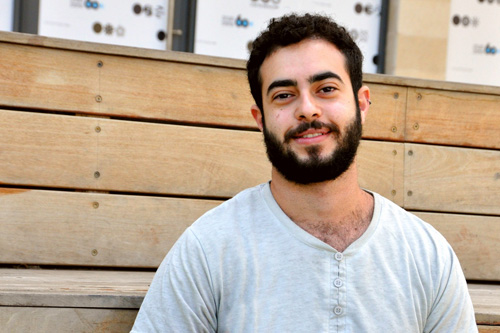

By Liat Amarant and Izi Silverstein
TEL AVIV — In Israel, everyone’s eyes are on conflict. Politics and social life become muddled together in a constant hyper-vigilance toward issues of security, borders, and ideologies toward a Jewish State. With eyes focused outwards, a community with similar pressing concerns of safety is slipping through the cracks, unnoticed.
While Israel touts itself as a safe haven for the LGBT community in the Middle East, and its protections are admittedly drastically better than in the surrounding area, the lives of many LGBT youth, particularly transgender youth, are precariously without support.
“Beit Dror” (House of Freedom, in English) is an emergency shelter for homeless LGBT youth located in Tel Aviv – the first and only of its kind in Israel. Beit Dror opens their doors to gay, lesbian, bisexual, and transgender adolescents who have been rejected and alienated from their homes and families because of their sexual orientation and/or gender identity. Beit Dror provides them with basic living conditions: a safe home, warm bed, and hot meals; and also with necessary tools to find successful and joyful lives in Israeli society, such as social support, immediate and ongoing counseling, and educational assistance.
Beit Dror is one of 16 hostels run by the Otot Association – A door to a new life, a registered nonprofit organization, established in 1981, that offers emergency accommodation for youth at risk. The goal of the care in the framework of the association is a reintegration of the youth into normative community life.
Beit Dror first opened in 2002, and in the subsequent 14 years, the effects of its work are readily apparent. Sam, a 24 year old transgender person (who was assigned female at birth but whose gender identity is that of a man) who lived at Beit Dror for a period of just over a year, illustrates the crucial and often life-changing resources that Beit Dror offered.
Sam came to Beit Dror when he was eighteen years old, after tension in his home escalated so much over the start of his Female-to-Male hormone replacement therapy that he decided it would be best for everyone if he moved out. Rather than ending up on the street, turning to illegal and often dangerous means of survival, he was able to find a support system that physically and emotionally helped him with his transition through genders and into adulthood. We had the opportunity to talk to Sam about his experiences at Beit Dror, and the ways in which his time here has shaped his life.

Izi Silverstein: How would you describe your childhood?
Sam Rosenfeld: Well I come from an Orthodox family so as you can imagine it wasn’t easy. In the Orthodox community there is a clear separation and different gender roles for boys and girls from an early age. This is what I struggled with most during my childhood – the actual gender segregation rather than the religion – the differences in the cloths we wear, the separate seating during prayer services in Orthodox synagogues or in public places, our day-to-day chores etc.
Izi Silverstein: Tell about a little about your relationship with your family?
Sam Rosenfeld: We’ve had a bumpy road together but I’m glad to say that things are getting better. I came out to my mother at the age of 15 as a transgender person and she didn’t take it very well. We had a different opinion about almost everything and the stress levels at home were soaring. As an initial compromise I was allowed to transfer from an Ulpana (religious school for girls) to a secular high school. This was already a relief in itself since I didn’t have to wear skirts and dresses anymore, but things at home were still very stressful especially since I wanted to start hormone replacement therapy and my parents did not approve. At the age of 18 I no longer needed their approval and I finally started taking hormones. It was at this point that I decided it would be best for me to move out to help with my transition.
Nowadays I am in touch with my family. I am closer to my siblings who accept me just the way I am. With regards to my parents there is some improvement as we are slightly closer but we still have difficulties.
Izi Silverstein: How did you end up at Beit Dror?
Sam Rosenfeld: I was actually referred to Beit Dror by a close friend who stayed at the shelter the previous year and highly recommended that I give them a call. Beit Dror was really the only living solution for me as things at home were getting very stressful over the start of my transition (I have already started the hormone replacement therapy).
Izi Silverstein: What is the importance of Beit Dror?
Sam Rosenfeld: Unfortunately many of us (LGBT youth) are still thrown out of our homes due to lack of acceptance by our parents and having a place like Beit Dror is a life saver. At Beit Dror we are accepted for who we are and aside from providing us with a safe living environment, a warm bed, a hot shower and warm meals, we are also provided with mental and social support that is truly needed. With regards to transgender persons in particular – it is amazing that someone can be there for us in our first steps of the transition to hold our hand and give us the necessary help and support.
Izi Silverstein: What more can be done in order to help the Transgender community?
Sam Rosenfeld: I would love to see additional Beit Dror Shelters opening up in Israel, particularly in the north & south of Israel, so that it will be more accessible for youth. I would also like to see transition housing opening dedicated to men (female transitioning to male).
Izi Silverstein: What’s the atmosphere in Israel like for LGBT community?
Sam Rosenfeld: I would love to say that the atmosphere towards the LGBT community in Israel is more liberal these days, but in all honesty we are still fighting for our basic rights on a daily basis. As a country – Israel is behind with regards to LGBT legislation and I’m looking forward to the day when we will be recognized as equals.
Izi Silverstein: Do you think things are changing in Israel towards the Transgender community?
Sam Rosenfeld: In recent years there have been a lot of media about the transgender community and I do believe that it is helping to change the perception in Israel towards us. Needleless to say, we still have a long way to go before the transgender community is seen as equal.
Izi Silverstein: What do you wish for the Transgender community in Israel?
Sam Rosenfeld: Well for a start – more acceptance from everyone. I also truly hope that Transgender people will have access to more financial & medical support.
Izi Silverstein: Would you have done anything different?
Sam Rosenfeld: To be honest I’m really happy with the way things turned out and I wouldn’t do anything differently.
Izi Silverstein: Any words of wisdom to the Transgender youth living at Beit Dror Today?
Sam Rosenfeld: Sometimes it seems really hard but it is definitely worth it! I worked really hard to get to where I am now and I can tell you this much – You CAN turn your life around! There are people who are on your side and there to help – Let them! You are not alone.
*
Amarant and Silverstein are volunteers at Beit Dror. The organization’s website is http://bethdror.org/english. Comments intended for publication in the space below MUST be accompanied by the letter writer’s first and last name and by his/ her city and state of residence (city and country for those outside the United States.)